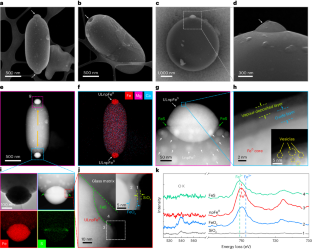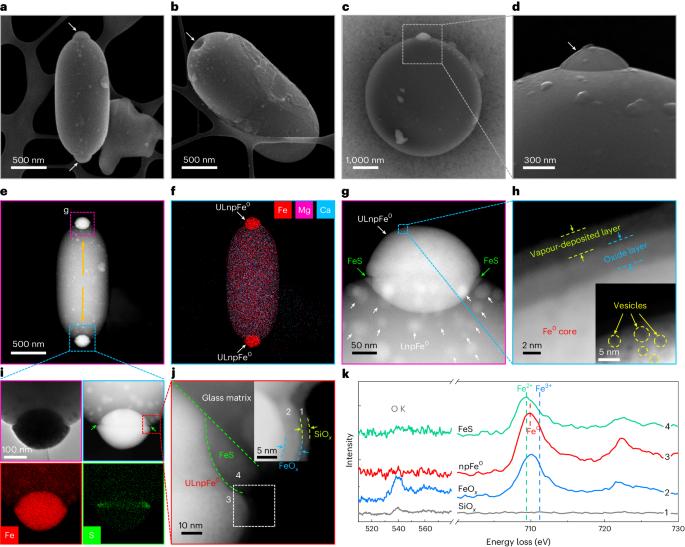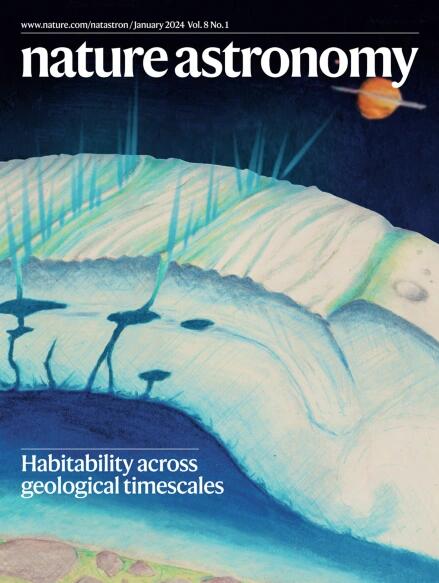Separate effects of irradiation and impacts on lunar metallic iron formation observed in Chang’e-5 samples
IF 12.9
1区 物理与天体物理
Q1 ASTRONOMY & ASTROPHYSICS
引用次数: 0
Abstract
Nanophase iron particles (npFe0) are generated on the surface of airless bodies by space weathering and can alter surficial optical properties substantially. However, the details of their formation pathways are still unclear. Here we use impact glasses returned from the Moon by Chang’e-5 to distinguish the relative contributions of solar wind irradiation and (micro)meteorites impacts to the production of different-sized npFe0. We show that solar wind irradiation can solely produce small npFe0, via implantation of solar wind ions into the topmost grain surfaces. On the other hand, (micro)meteorite impacts produce directly large npFe0 in melts, through impact-triggered disproportionation reaction or thermal decomposition. These nanoparticles are also capable to further coalesce into micrometre-sized Fe0 particles during impacts. These findings can help in predicting the space-weathering behaviour of regions exposed to different space environments. A lunar glass bead can preserve nanophase iron (npFe0) of varying sizes via multiple mechanisms. The formation of small and large npFe0 with distinct weathering effects is independently governed by solar wind irradiation and micrometeorite impacts.


在嫦娥五号样品中分别观测到辐照和撞击对月球金属铁形成的影响
纳米相铁粒子(npFe0)是由空间风化作用在无空气天体表面产生的,能极大地改变表面光学特性。然而,其形成途径的细节仍不清楚。在这里,我们利用嫦娥五号从月球返回的撞击玻璃来区分太阳风辐照和(微)陨石撞击对不同大小 npFe0 生成的相对贡献。我们的研究表明,太阳风辐照只能通过太阳风离子植入最顶端的晶粒表面来产生小的 npFe0。另一方面,(微)陨石撞击通过撞击触发的歧化反应或热分解,直接在熔体中产生大型 npFe0。这些纳米颗粒还能在撞击过程中进一步凝聚成微米大小的 Fe0 颗粒。这些发现有助于预测暴露在不同空间环境中的区域的空间风化行为。
本文章由计算机程序翻译,如有差异,请以英文原文为准。
求助全文
约1分钟内获得全文
求助全文
来源期刊

Nature Astronomy
Physics and Astronomy-Astronomy and Astrophysics
CiteScore
19.50
自引率
2.80%
发文量
252
期刊介绍:
Nature Astronomy, the oldest science, has played a significant role in the history of Nature. Throughout the years, pioneering discoveries such as the first quasar, exoplanet, and understanding of spiral nebulae have been reported in the journal. With the introduction of Nature Astronomy, the field now receives expanded coverage, welcoming research in astronomy, astrophysics, and planetary science. The primary objective is to encourage closer collaboration among researchers in these related areas.
Similar to other journals under the Nature brand, Nature Astronomy boasts a devoted team of professional editors, ensuring fairness and rigorous peer-review processes. The journal maintains high standards in copy-editing and production, ensuring timely publication and editorial independence.
In addition to original research, Nature Astronomy publishes a wide range of content, including Comments, Reviews, News and Views, Features, and Correspondence. This diverse collection covers various disciplines within astronomy and includes contributions from a diverse range of voices.
 求助内容:
求助内容: 应助结果提醒方式:
应助结果提醒方式:


